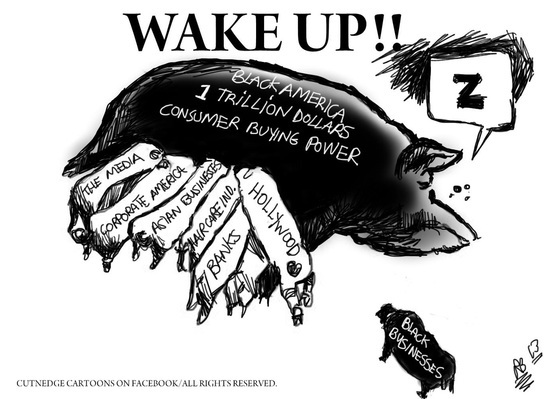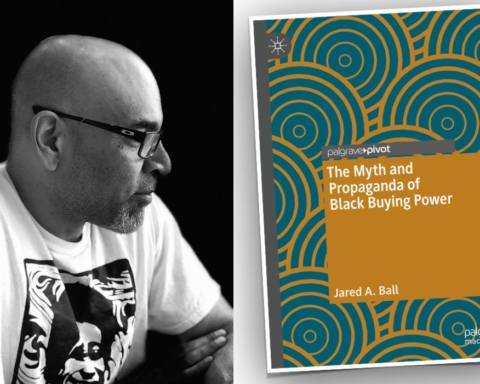We’ve all read or heard reports about $1 trillion dollars plus in Black buying power. We’ve also heard how this buying power makes us an economic force to be reckoned with.
However, there are some that challenge this notion. Dr. Jared Ball, professor of communication studies at Morgan State University, is one of those people. He says this trillion Black buying power simply doesn’t exist. We spoke to him to find out more about why he believes so.
Black Buying Power a Myth or Reality?

What is the biggest misconception about the term, “Black buying power” and what does buying power actually mean?
The greatest misconception is that “buying power” means Black people collectively actually have this kind of wealth or economic strength when, in fact, Black people are economically no better off in relationship to the broader economy than was the case shortly after enslavement proper was ended in 1865.
The phrase “buying power” is itself a marketing phrase developed to helped advertisers target their marketing. “Buying power” is the “power” to spend money that is specifically allotted for certain purchases but is not – as even the purveyors of the phrase admit – an indicator of income or wealth.
So, a bank WILL lend me $30k to buy a car but it will not give me that same amount to invest in stock, buy land, or start a business. So my “power” is in the ability to be seen as worthy of a car loan from a bank but does not mean I have $30k in the bank or in my pocket.
You’ve stated, “The myth functions to falsely blame the poor for being poor.” Please explain.
People hear all the time that Black people “have $1 trillion” in “buying power” but yet are somehow at the same time at the bottom of every economic indicator that measures the actual condition of any group.
How could this be unless Black people are just “financially illiterate” or somehow deserving of their unequal position? So without stating it explicitly the myth tells the world that Black people are only poor because we mismanage our money or are too dumb to invest in wealth-creation instead of buying rims or hair. It’s absurd.
Poverty is an intended and necessary outcome in a capitalist economy and is never the result of a group’s collective mismanagement of funds or wealth.
In your opinion, what should the Nielsen (and related reports) actually be used for?
Nielsen reports (any report on anything for that matter) should only be used to assess what it intends or claims to measure. Beyond that, perhaps, the value of these reports is in how they expose the nature of marketing, propaganda and abuse of economic analyses.
That is, these reports should be used either by marketers to determine how to target their advertising dollars or by the rest of us to study how these advertisers research and market to us. The problem is people keep using these reports to make judgments about the actual conditions of Black people collectively and this is simply unsound.
So we hear time and again people make reference to this “$1 trillion” in “buying power” followed by some kind of encouragement that we do not spend foolishly and we will be better off. But this is false and no one who makes these claims ever checks the sourcing of the number or how it is developed.
For the details on how these numbers are reached folks will have to review my entire body of work on this at imixwhatilike.org but the short of it is that the numbers are based on a variety of spurious variables most of which are attached to survey data of a segment of the shopping population.
But, again, these numbers have nothing to do with what Black people actually have because as all honest studies show Black people have almost no money whatsoever and this has nothing to do with bad habits and everything to do with capitalism and centuries of White supremacist exclusion and exploitation.
A recent news article stated that Black employment is up. The same day, another said it’s down. What are your thoughts on the importance of getting factual information especially when it concerns us?
First, commercial media is no place to start for any subject regarding anything whatsoever. Commercial media will only serve to confuse almost any subject or situation, economics supreme among them. Employment numbers are shady and often misleading.
Folks should always refer to real data that comes from places like United For a Fair Economy, The Economic Policy Institute, or Demos and from scholars like those I reference throughout my work on this subject.
From there people will see a far more realistic set of horrific conclusions reached that support what folks actually experience out here. We don’t have money or access to capital. 1% own 3/4 of all the stock. What can we invest in even if we wanted to?
A lot of your work focuses on the growing wealth gap and inequality that exists between Black and white households. What is your response to those who say we should stop comparing ourselves to white people?
Then like the old Les McCann classic asked, “compared to what?” I mean, I understand the limitations there, but it’s not about comparing to white people as much as it is understanding our place in this economy (which is to supply cheap labor and consume available goods).
But this question explains too much about what we don’t understand. We are always encouraged to focus on the salaries of famous athletes and entertainers and to see what they buy and how they live. But this is done purposefully so that we never think to look at the lives of those who cut their checks.
So we talk about Lebron and his money but not in relation to Phil Knight or Dan Gilbert, those who cut his checks. So we miss not only how even Lebron James is merely a well-paid producer of wealth for others but how little he makes in relationship to them. James cannot manufacture shoes or professional sports leagues (this was the problem Kanye ran into and why he appeared to lose it with Sway). James is paid by Nike. That is very different from owning Nike.
What do you feel are some effective collective wealth building activities that the Black community should be involved in?
More of us should be involved in radical economic study, social and political movement organization building, and the development of ways to redistribute wealth, goods, and services to make sure no one goes without.
There is no economic solution to poverty and inequality. Economics is political. We need better politics and organization not fantasies about wealth creation.
You can follow Dr. Ball’s work at imixwhatilike.







